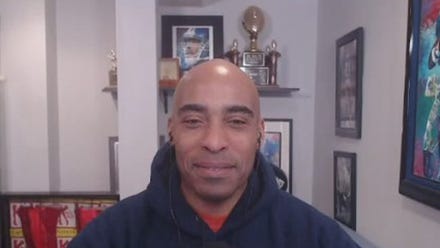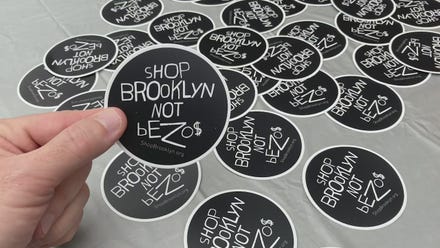
-
Small Business Spotlight: Retired Giant Tiki Barber Extends His run with Key Business Pivots
Post Views: 652By Joe Connolly and Neil A. Carousso
NEW YORK (WCBS 880) — Retired running back Tiki Barker is elusive and quick on the gridiron and in the boardroom.
Barber played ten seasons in the NFL with the New York Football Giants. Since retiring, he has followed his passion for business in which he earned his degree from the University of Virginia.
“What I learned, obviously from my football career but also my early business career, is that relationships are invaluable,” he told Joe Connolly and Neil A. Carousso on the WCBS Small Business Spotlight.
When the market crashed in 2008, the three-time Pro Bowler had to get out of an affordable housing partnership he entered with billionaire real estate developer Stephen Ross after he retired from the league in 2006. But, the relationship he formed and maintained with The Related Companies chairman and Miami Dolphins owner led to an opportunity years down the road when Ross invested in Thuzio – the events company Barber co-founded in 2012.
“How you manage those relationships are of paramount importance for things down stream,” Barber explained.
He finds it liberating to find new ways of doing business. That realization came when Thuzio was forced to make a halftime adjustment amid the coronavirus pandemic.
It moved online and hosted private virtual business talks with celebrity speakers, including “Shark Tank” star and FUBU founder Daymond John, retired New York Jets linebacker Bart Scott and executive chef Josh Capon. Barber and his partners later changed the business model to make all virtual events free because their presenting sponsors were willing to pay a premium for more viewers.
“More importantly, you want qualified eyes,” he said, adding, “You want to know who your audience is.”
The “Tiki & Tierney” co-host told WCBS 880 they create events for their sponsors to target specific business executives and groups who are likely potential clients. For example, sports betting operator DraftKings sponsored a Thuzio virtual talk with Barber and retired New York Mets captain David Wright.
“We have this aggregation of business executives who you specifically want to talk to and we’re bringing them together over a shared passion for sports or food or wine or business information,” Barber said of Thuzio’s appeal to sponsors.
The company hosts about 35 virtual events a month, which he said would be near impossible for them to pull off in-person. Thuzio grew from eight employees to 15 in the pandemic amid rising demand for content.
Barber’s business mindset has been shaped by his mentors and experiences in the NFL. The Giants great told Connolly and Carousso he was inspired by Jon Gruden’s motivational tactics. Gruden was the head coach for the Tampa Bay Buccaneers where his twin brother Ronde Barber played cornerback and won a Super Bowl in 2002.
“We all have things that disrupt our lives,” Tiki said, noting the hardships suffered in the pandemic. “Sometimes, you have to get up and fight for yourself and fight forward for your country and as an individual. And, that’s essentially what (Gruden) was saying.”
Barber tries to portray positivity and enthusiasm among his employees, because, as Barber recalled Gruden’s message, “It’s not just for you, it’s for people who are around you.”
Football is a team sport and the ex-Giant used it as an analogy in business throughout the Small Business Spotlight conversation. Giving the play-by-play of his Giants team record 95-yard touchdown run against the Oakland Raiders on December 31, 2005, he emphasized the blocking by his teammates that catapulted him into the end zone that Saturday night.
“Understanding that it takes everyone even those who don’t show up on the big screen in order to be successful” is the mantra that guides Barber’s post-football career.
Watch Joe Connolly and Neil A. Carousso’s conversation with Tiki Barber on the Small Business Spotlight video above.
-
Small Business Spotlight: Brooklyn Startup Puts Local Stores Online
Post Views: 620By Joe Connolly and Neil A. Carousso
NEW YORK (WCBS 880) — A Brooklyn startup has made shopping local in the pandemic easier and it is helping connect small retailers with customers online.
ShopIN.nyc is “the everything store,” as founder and CEO Maya Komerov describes it, for a variety of hometown products.
“People really want to shop local, but the truth is it’s not convenient,” Komerov told Joe Connolly and Neil A. Carousso on the WCBS Small Business Spotlight.
When the pandemic hit, she saw small businesses struggling and large e-commerce companies like Amazon were thriving. Boasting the slogan “Shop Brooklyn Not Bezo$” on its merchandise, Komerov told WCBS 880 she doesn’t like to think of ShopIN.nyc as in competition with Amazon, but they are making it easier and cheaper for small businesses to sell online.
“A single store cannot provide that,” she said of e-commerce. “That’s a fact and that’s something that we need to change immediately and that’s the technology that we built to make that change.”
It is free for businesses to join and the startup pays owners within 24 hours for sales on its website.
Komerov has a background in technology. She sold her first company, Blat Lapidot Business Applications – a Salesforce partner in Israel – in 2017 before moving to New York. She went to the drawing board for ShopIN.nyc in April and launched in July. They currently support 70 stores on the site and house their products in its Brooklyn warehouse for delivery. Thirty New York City stores are waiting for approval.
“They don’t need to go and bring stuff from a warehouse in New Jersey and have all those trucks,” said Komerov, explaining ShopIN.nyc’s appeal. “We build technology to allow the stores to work in a decentralized warehouse to serve the neighbors.”
ShopIN.nyc delivers products the same day an order is placed in one box with the stores’ branding on the package. They pay delivery workers $25 an hour – higher than the $15 minimum wage in New York City.
The e-commerce startup separates itself from other online sites in that it invests in communities throughout New York, including supporting schools.
“Online shopping should be part of the community just by connecting all the stores that are already part of the community together,” said Komerov. “We build more and more tools to allow the money to come back.”
By achieving this, ShopIN.nyc is localizing e-commerce and bringing the neighborhood to the customer.
See how ShopIN.nyc is helping local businesses connect with customers on the WCBS Small Business Spotlight video above.
-
Small Business Spotlight: Entrepreneur Magazine’s Editor-In-Chief Shares What Owners Can Do Now to Survive
Post Views: 867By Joe Connolly and Neil A. Carousso
NEW YORK (WCBS 880) — The coronavirus pandemic has accelerated a seismic shift in consumer behavior that has induced stress on business owners.
Jason Feifer, editor-in-chief of Entrepreneur Magazine, told Joe Connolly and Neil A. Carousso that business owners must incorporate technology infrastructure for long-term sustainability and listen to their customers to try to anticipate future needs.
“You need to be in touch with them regularly – surveying them – so that you can start getting data back on what it is that they’re looking for, what’s resonating with them and what’s holding them back on being your best advocate,” he said.
Feifer advises business owners to create an email newsletter to communicate with their customers rather than relying on social media.
“If you think that being in touch with your customer by Facebook is good, it’s not,” he said, explaining, “You’re losing people to the Facebook algorithm and you don’t own that audience.”
The Entrepreneur Magazine chief said customers will point owners in the right direction, and oftentimes, it can be a little change that can make all the difference in surviving the pandemic.
Feifer told Connolly and Carousso it is important that business owners look within themselves.
“Ask the simple question of ‘Is this company doing what it needs to do to survive for the next five years?’ Ask yourself that every single quarter and at some point you’re going to start to say, ‘Oh you know what, actually, I’ve noticed that our consumer is wanting this and this and I don’t know if the thing that we’re doing right now is going to last five years,'” he said, noting that type of honest assessment help owners make the appropriate adjustments.
Feifer is an impassioned entrepreneur, himself, running a production company in which he also hosts three podcasts, serves as a keynote speaker, and has co-authored a novel.
“I stopped watching basketball,” he quipped about how he finds the time for his professional endeavors.
But, it’s that entrepreneurial spirit that has been reignited as millions of Americans work remotely and others are starting businesses as a way to reenter a battered labor market.
Feifer told WCBS 880 many Entrepreneur Magazine subscribers are starting a “side hustle.” Starting any business, especially now, he said, requires a keen focus on one’s business plan and market.
“The number one way that people get stuck is that they have 10 ideas and they can’t decide which one and they start to kind of noodle on them all and they get nowhere,” Feifer said. “You got to just start somewhere.”
Creating a valuable service or product right now can be a win-win for the entrepreneur and their current employer.
See examples, actionable advice and new business ideas on the WCBS Small Business Spotlight video above.
-
Small Business Spotlight: Business Opportunities Up for Grabs
Post Views: 661By Joe Connolly and Neil A. Carousso
NEW YORK (WCBS 880) — Many businesses are facing the grim reality of closing operations this winter as COVID-19 and its new variants surge, but there may be opportunities to pursue before termination.
The new round of small business loans cannot be obtained by large companies unlike in the spring when some corporations were able to take advantage of loopholes in the first coronavirus relief package.
There is an additional five months of support for restaurants and businesses in industries hit hard in the pandemic, namely, tourism, transpiration, retail and performance arts. And, 40 percent of those loans can be used for new services as well as rent and utilities; that’s contrary to the first installment of the Paycheck Protection Program (PPP) loan which was instituted to make sure employees are paid as part of the loan agreement.
Ian M. Weinberg is a Certified Financial Planner in Woodbury, Long Island. At his firm Family Wealth & Pension Management, LLC, he is advising business owners to manage risk by pivoting into similar services. An example he points to on the WCBS Small Business Spotlight is a clothing company that starts making uniforms for essential workers.
“I know the shipping business is getting huge. How can I take my business that’s in the clothing business and help that evolve and get integrated into this new economy?” Weinberg hypothesizes. “If you’re surviving in what you’re doing but you see that there’s an opportunity to launch elsewhere, you can use these PPP funds to do some of that.”
Sixty percent of each PPP loan must be spent on payroll or the loan would no longer qualify for forgiveness.
He acknowledged many business owners will not survive, but he told Joe Connolly and Neil A. Carousso many of his clients that are in trouble did not adjust their operations.
“A restaurant that didn’t have curbside takeout, didn’t have a digital ordering system, you couldn’t order online and pickup, they don’t take credit cards,” Weinberg said of businesses that closed in the pandemic.
He asserted business owners cannot fall behind the times, but they must keep costs down.
“You can commit technology, you can leverage technology, you can outsource technology, you could outsource your staffing,” Weinberg explained. “We could be running a business that’s an investment banking firm right now, handling billions of dollars just like this: sitting in three Zoom calls. We don’t need any more overhead.”
He told WCBS 880 that he has seen non-profit organizations have much success with virtual fundraisers.
“They were still able to raise a million dollars and their overhead for the event was less than $200,000 because they didn’t have to do the banquet hall, the catering, the staff on site, the liabilities and they’re finding that going digital really helped them leverage their resources and the charity made $800,000 instead of half a million on the same event that people would have showed up to in black tie and tux,” said Weinberg of one charity that he advises.
The financial advisor emphasized there are opportunities right now, but owners have to be flexible and consider options outside the box.
Weinberg told Connolly and Carousso about a large catering business that made one of the most successful pivots he has seen: They applied for a New York City government contract to feed the homeless. That has kept his client’s business afloat.
“They focused their efforts from catering to for-profit organizations and parties and events to identifying a need where the city had to feed people, the city had to pay for that food and the vendor service to do it and they were fortunate enough to find out about it and they went after it,” he said.
See more local examples of successful business pivots and how to use your skills to fill pandemic needs on the WCBS Small Business Spotlight video above.
-
Online Sales Keep Small Businesses Afloat but Pandemic Losses Are Insurmountable
Post Views: 658By Joe Connolly and Neil A. Carousso
NEW YORK (WCBS 880) — Increases in online sales are not covering losses suffered in the coronavirus pandemic for many small retailers, but it is allowing them to stay afloat during the unprecedented holidays as hospitalizations and deaths due to the virus surge.
“I’m happy to report we’re surviving,” Jennifer Bergman of West Side Kids said on the WCBS Small Business Spotlight, sponsored by BNB Bank.
Bergman’s Upper West Side toy store is in the midst of their annual busy season, but overall sales are down about 50 percent. Her busiest day of 2020 was December 9 – the day before Hanukkah.
“Our online sales have never generated enough business for me to invest in expanding that so it’s always been a real catch-22,” she explained.
Bergman is not alone. Many small businesses are struggling to develop a profitable e-commerce strategy. Those who had one in place before March were best positioned to pivot amid shutdowns, but still, it is difficult to compete with online retail giants, namely Amazon and Wal-Mart.
“It costs us a lot more to process online orders and we’re going in early and we’re staying late to get them all done,” she said.
Tom Geniesse owns Bottlerocket Wine & Spirit in the Flatiron District. He had more than a head start on his e-commerce; he owns several patents on the display of his website, which shows different pairings of wines that go well with various meals.
“The customer-centric focus is on giving people choices that map to their needs,” he told WCBS 880. “By doing that, we give people an opportunity to make better decisions when they’re making a bottle of wine.”
Geniesse is educating his customers virtually. Before opening the doors to his wine shop in 2003 with the goal of making wine more accessible to the average consumer, he owned an e-learning business company named Quisic from 1996-2001. That experience is paying dividends 19 years later.
He told Joe Connolly and Neil A. Carousso he has put Bottlerocket Wine & Spirit on numerous e-commerce platforms, including Instacart, Grubhub and other niche websites. That exposure and marketing has given him a 25 percent bump in online sales, but it does not make up for Geniesse’s overall sales losses in the pandemic. His challenge now is finding new customers who have fled Manhattan.
“People that can work remotely have continued to work remotely and residential folks in Flatiron tend to be affluent, tend to have second homes outside of the city and many of those people have moved out in March and have remained away,” said Geniesse, continuing, “We’ve really had to be entrepreneurial in finding customers that are new customers, reach to a broader audience in the city and find the people that are here and working here and living here.”
He told WCBS 880 he believes the pandemic is an inflection point on the viability of local businesses’ e-commerce sales operations.
“I do think that e-commerce has been on a 20-year trend, increasing online sales for businesses everywhere and this pandemic has hurdled us forward about 10 years in that trajectory,” said Geniesse. “We’ve always been online, we’ve always had an e-commerce platform, but I think what this has shown us is that this is critically important for us to keep our efforts focused on e-commerce and continue to grow in that way.”
Hear ideas on how to find new customers online and learn about the changing landscape of e-commerce on the WCBS Small Business Spotlight Podcast on the RADIO.COM app or on the media player above.
Technology
Social Feeds

VIDEO: Told the airline to book us on the next flight out (SPONTANEOUS TRIP!)

VIDEO: The Taylor Swift Effect | WCBS Business Breakfast

VIDEO: Future of NYC | WCBS Business Breakfast

VIDEO: Reasons for New Yorkers to be Optimistic | WCBS Business Breakfast

VIDEO: NYC's AI Chatbot | WCBS Business Breakfast






